
Bianca: I am extremely passionate about the philosophy of photographic practice and how we can continue to become more of ourselves through this tool that is usually a trigger for most. To use photography as a tool and a portal to really get truer and deeper into our own self discovery.
The portal being the pictures, the taking of the pictures- as far and as wide as you want to go with it. I feel like we have the opportunity to make every part of that process something that supports us and affirms every part of who we are rather than using it to just showcase one facet of who we are.
Megan: I feel like you've really helped me with that in our own conversations and picture taking. We were just talking about how one of our clients is also one of your clients and we've had this joint feeling of:
It's so helpful to have these pictures
And it's layered and can be almost confronting to see yourself in such a true way.
Especially as a business owner and a podcaster, integrating these visuals into telling your story more is really helpful.
And at the same time you're like: Ooh, that's me and what sides of me do I want to show and how willing am I to show up fully as myself?
I have opened my eyes so much to the layeredness and the depths that, if you allow photography to have, it can have if you're open and willing to it.
And I love our intersection between the two, it's same-same with podcasting, right? Yours is in the visual and mine is in the audio, but we can have those same experiences in in both worlds.
Storytelling on Substack through Authentic Photography
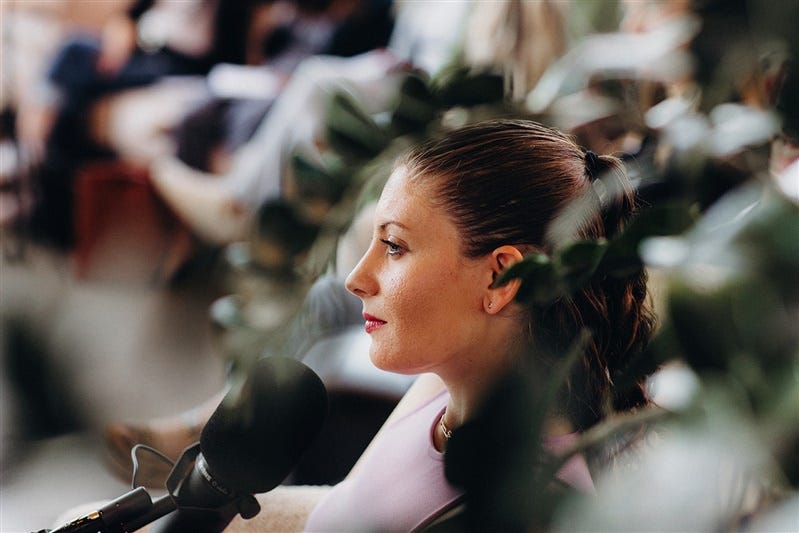
Megan: So let's talk about how you've supported me in Substack. Since I've learned your philosophy and seen visuals through your eyes from the mom side of my life, I'm documenting differently because I have this archive-my-life mentality.
Infusing your mindset in the business side has allowed me to look at branding differently, to really show the truth of what's happening.
For example, pairing your real-life photography with my podcasting has furthered that journey and message, giving it some life other than just the words.
Bianca: Depth. Yeah. I truly believe that a lot of the marketing imagery that we see is so one dimensional that it flattens the voice that we have in our podcasting or content.
We went into podcasting because we have something that we're super passionate to talk about and what is more important than our voice?
But voice isn't just literally our voice- it's also our visual identity.
We are so uniquely us and we're in someone's earbuds and we're having this intimate connection and then (and I'm not even throwing shade. I welcome and love all of it.) But when you pair something that's so intimate with a recycling of people in a blazer, behind a backdrop, over and over and over again and that's the only type of photography you're seeing of that person. I just feel like it creates this divide between the listener and the person.
Because it's like I'm hearing this person and I really resonating with what they're saying. And then I'm looking at that picture and I can't touch that.
I love me some gorgeous, planned and empowering, put the blazer on and the makeup photos too. But I just think that the more we can diversify and the more we can really deepen into where we want to go with our voice, we can do the same work with our visual imagery and just funnel down that trust way faster.
Letting Our People SEE Us

Megan: Yeah. What I hear you saying too is: your audience has the opportunity to truly hear us, and if we allow it, to be vulnerable and hear our isms and hear what we really have to say. And I'll kind of explain the difference in photography that I see and feel with you, but when they see a picture that’s not “us,” we're not being fully seen.
Bianca: Right. My podcast is super audio journalistic and I had just had an experience the other week where I almost didn't post it. I was like, I don't know, maybe it’s a little bit much? And then, I was like, but what is even more important?
It was more important for me, not necessarily for the listener, to have had that thought and to proceed. (And I'm not saying always go out there and be super vulnerable- ripping your clothes off and running around naked, especially if that does not feel good for you or doesn't resonate at all.)
But I'm saying I knew where I was coming from when I recorded and even though I felt a little all over the place- I am all over the place. And to me, sharing that feels like bringing down a wall of: this part of you is not really welcome. And I think I've done that visually too.
I record video with my podcast and I knew from the start, if I had to stop and put on makeup every time I'm gonna record a podcast- I’m not going to record the episode. So now I'm just used to posting videos of myself without makeup, which wasn't an intentional thing, but it is very freeing to just show up as myself, as enough- I feel like it's really helped me pull down a lot of walls very quickly.
Megan: I would say that's the difference between the pictures that you take and the traditional branding shots because your focus is not typically, sometimes you do, but not typically on posing somebody. It's about the “live action” or living shots.
When we've worked together in the studio, whether it's been for me or for clients, it's been capturing them in the act of podcasting, or creating, them doing their thing where they're opening up and being themselves and you're catching the gold.
And what plays back in my head that you've said, capturing: how everybody else sees you when you're in those moments.
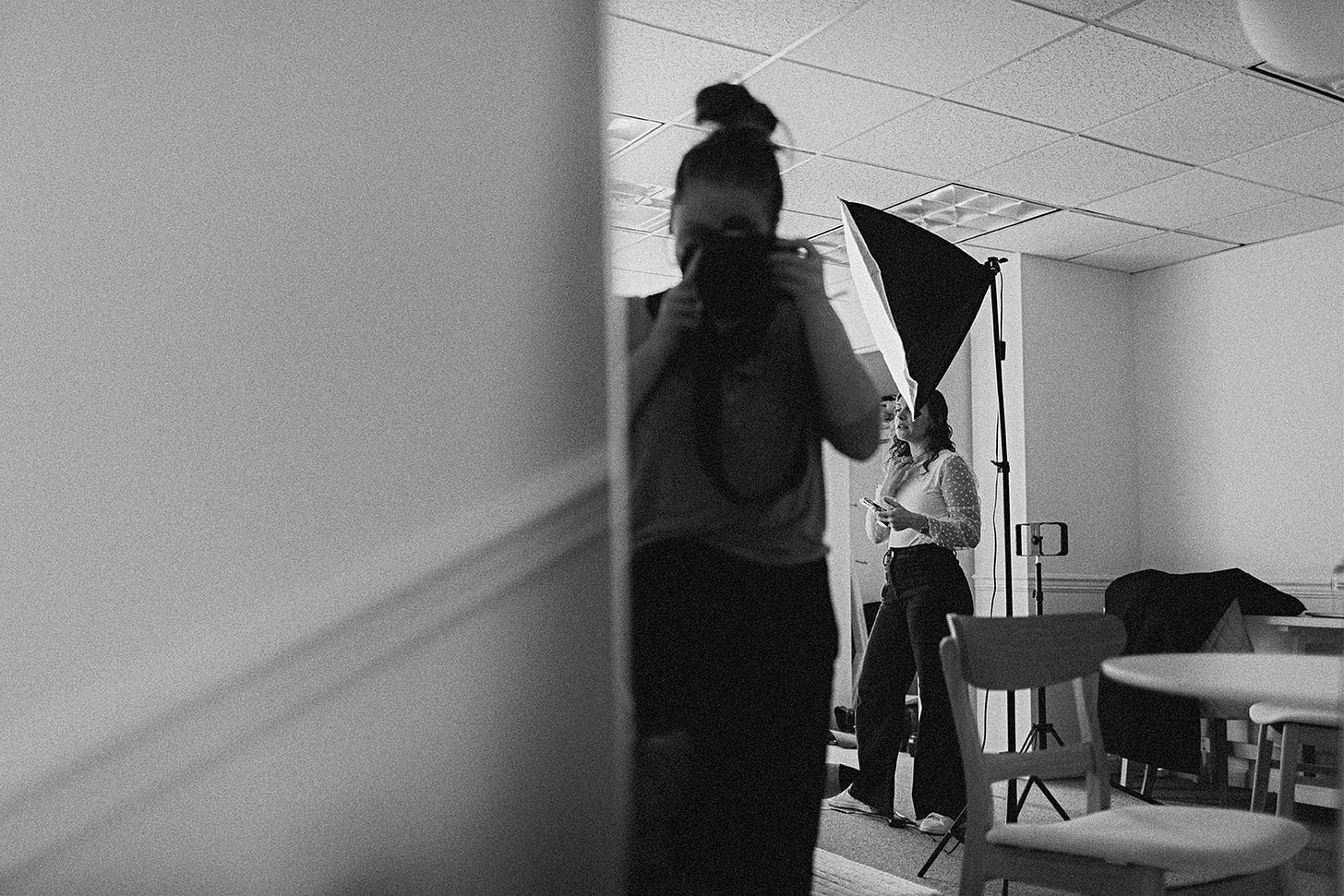
Which comes with the confronting piece when you get to see yourself and be like: Oh, that's what I look like when I'm doing the thing? It's so multidimensional because then you, start to love into it more.
The more I looked at these pictures, the more I pulled into my favorites. The ones that I didn’t know if I liked the way I look, now the more I've come back to this archive, the more that I've needed to pull pictures as I tell this story through my podcast (learn about my Substack process here) has given me a deeper appreciation for myself. As I look back and some of these pictures now are six months old and my kids are different ages and I look at these pictures that at first were not my favorites and I'm like, Oh, I actually like this one now.
It's like you get to deepen your relationship with yourself.
As you, I play into, visually, what do I want to continue to tell my story and give my podcast more of a life than just the audio, it's this beautiful package that I know wouldn't be what it is if I did not have this from you. This style of photography, this archive to come back to and this realization of how I can pair those things together to create something really true.
Being a Conscious Creator
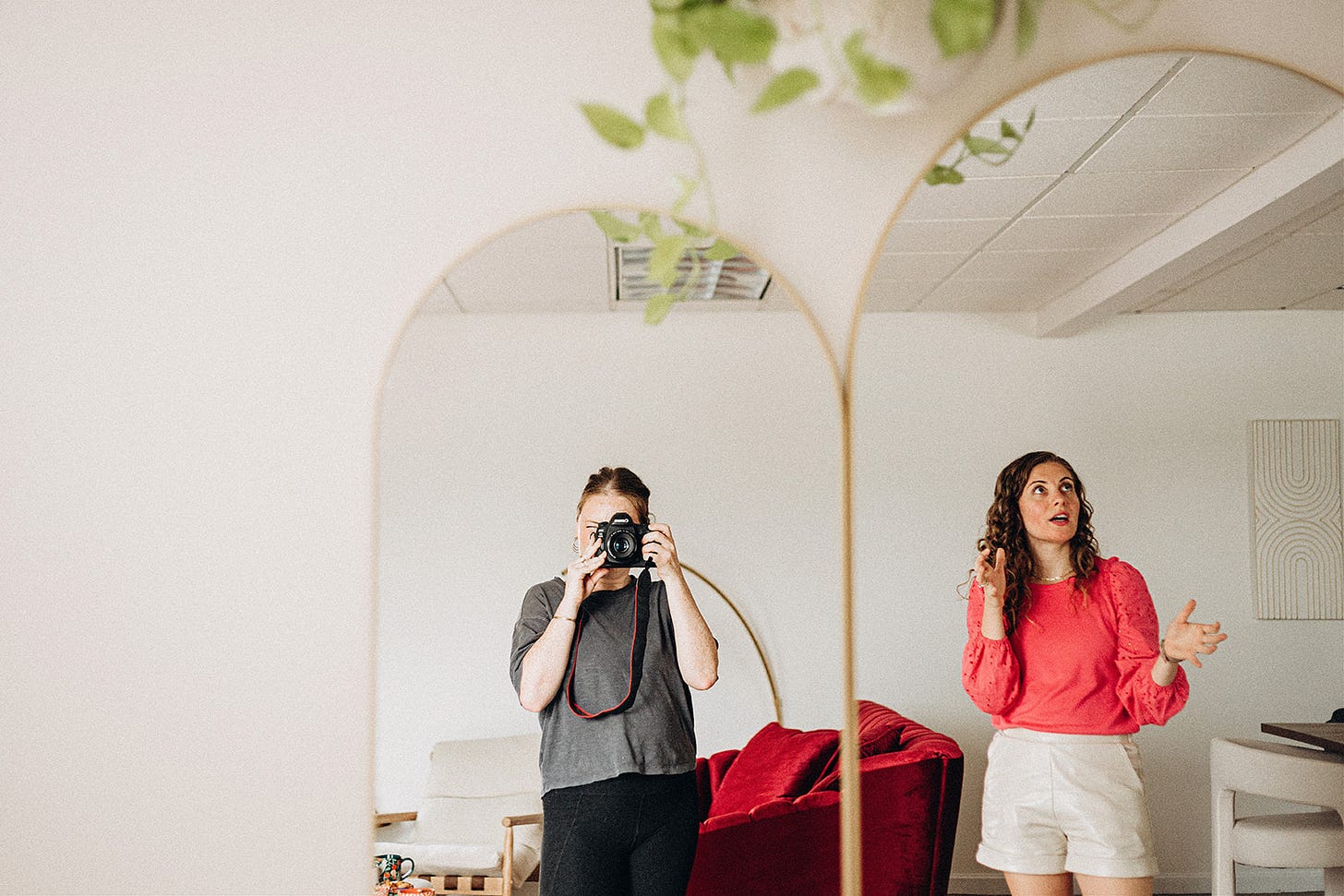
Bianca: And I feel like that is a transformation in and of itself every time. For you to say, write and read your own words and then have that sentiment on your chest while you're looking at these images and decide what pictures feel like a good match- what happens when you combine the two and you see it on a page is so empowering.
I feel like so often we hear about content creation in terms of more. I need more content, I need more pictures to pair with it. You lovingly created this message, from your podcast or whatever it is, and then you're looking for something to slap on it to be able to post it somewhere.
But really what does that look like when the thing you're pairing is also as intimate as the thing that you created in the first place? It's really 10x-ing that connection point and the resonance of it.
Megan: And something else that you've brought to my mind is this concept of being a conscious creator. As we have been going through this process together of: Do we need to churn out content? Do we want to keep making more of what everybody else is making?
We were helping people create content and it was really easy to do, but then we were like, it's more of the same. It doesn't have the life in it that we want, that we’ve had in other spaces. And so I feel like I personally have changed the way that I'm showing up thinking, I don't need to just churn out content for consistency’s sake.
I can be more intentional. I can think about what I want to say. And I don't need to think about how it can be pulled into a bunch of little sound bites. I'm recognizing that I like long form and I prefer that. There's nothing wrong with short form. It's just not my favorite thing.
And so, I think having all of these tools in my tool belt allows me to tune in to what feels good to me and actually take aligned action versus just doing more of the same.
Have you noticed yourself change at all since we've had these conversations?
Bianca: Yeah, I think that when we think about how we want to work, there's just an infinite amount of ways you could do anything, that people have already done it, and then that no one's done it. And it really doesn't matter. Aligning with whatever feels good to you is the most important part.
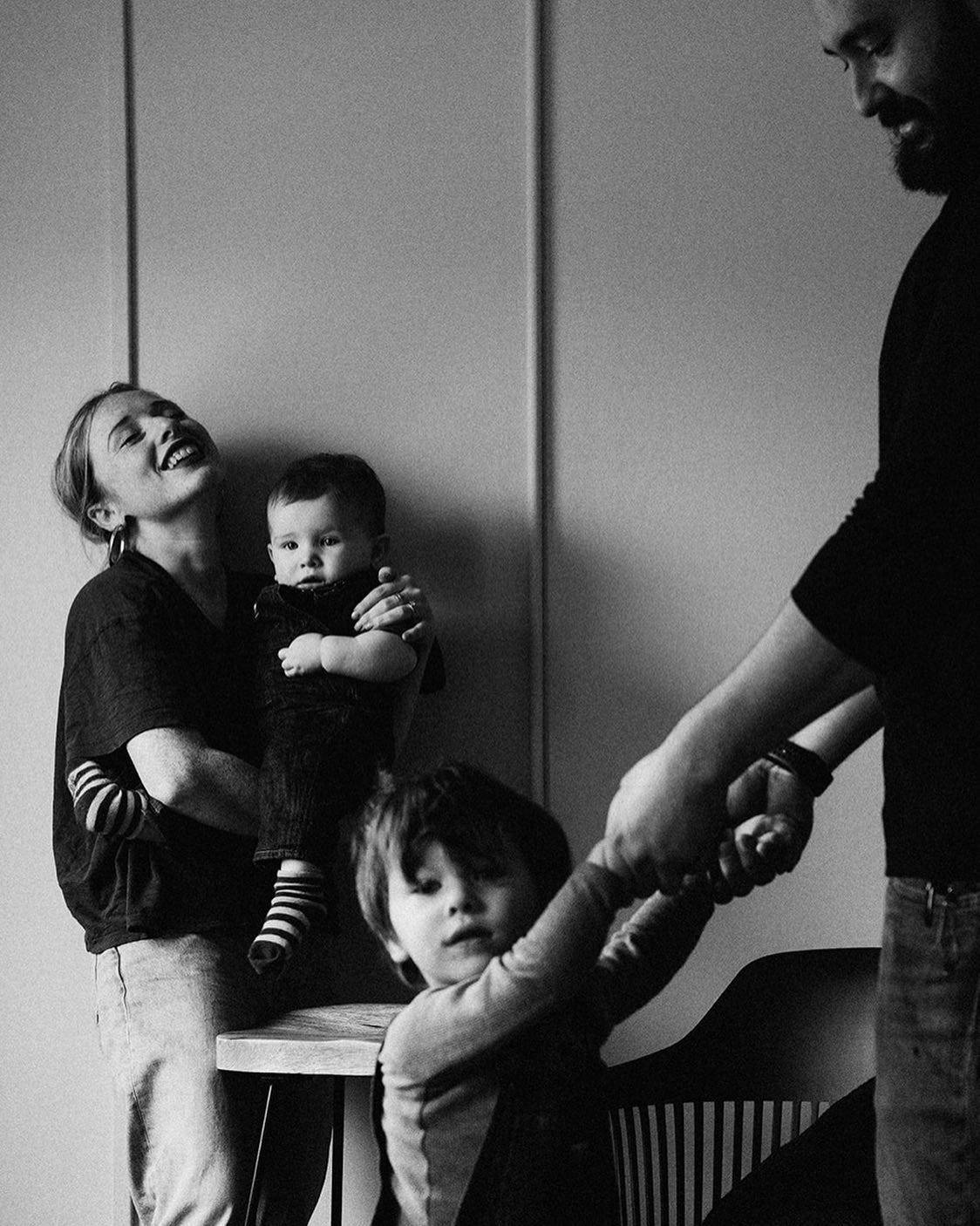
And I think, especially in the online space, it could be so easy to lift your head up and be like, wait a minute. How do I get here? I'm not even resonating with myself at this point.
And so, I think that keeping the deliberate consciousness involved in those little steps really helps you not get too far away from yourself in that way.
Megan: There's no one right or wrong way. There's no be all end all answer. You are your highest authority. You know what you need or want to do, if you're willing to listen to what that is.
2024 Visual Branding Trends
Bianca: My hot take is that this type of intentionality and documentation- this way of using photography and images of yourself in your work with this lens- is actually one of the biggest mindset hacks you can have.

Because: What happens underneath? What happens inside of you when you try really, really hard and you get posed and you're contorted in this way and you can take a picture and you're like, Oh, I love the way I look. Nothing wrong with that. And also unconscious, subconsciously, you had to do this, this and this to make it happen.
Think about how elated you are when there's a picture someone took of you candidly that you weren't prepared for and you love the way you look. There's nothing like that feeling. And I'm not saying it's always going to happen like that, but we all know as women that grew up looking at ourselves the decade before and remembering how you nitpicked yourself.
How many years of our lives are we going to look back and realized how aweomse we looked?
So I think that when we use that muscle to bring our nostalgia to the now, bring our hindsight to now and be like:
I'm going to create an archive of what it looks like in my life, with my business, with myself, creating this holistic view- you’re giving yourself the opportunity to, like you said, look back way shorter than you might think and be like, Oh, actually, I see the magic in that, or I'm proud of her. I feel compassion for my previous self. Whatever it is- it's all about being able to open your mind up to seeing yourself, I don't want to say differently, but I think deeper, like you're seeing yourself from this like higher self perspective.
And then to take it one step forward. When you post a picture that doesn't necessarily feel like the most manicured version of yourself, the layers that that begin to fall down- I feel like it's a fast forward button in terms of perspective and appreciation.
Megan: One thing I want to share is that you are trained in NLP, Neuro-linguistic Programming, which is very much about the subconscious.

And so what you said now of: When we pose ourselves, then (what I hear you say and what I feel for myself is) that becomes the subconscious narrative of when I do this, then I am good, then I look good. And so I think what you've helped me with through your photography work and through continuing to come back to this archive- has been rewriting that narrative to: I am worthy as I am.
I don't need to pose myself to be good enough.
I don’t need to show up and do X, Y, and Z, to be in front of people.
I can show up as I am, and that is not even just good enough, but that’s great, and worthy- the end.
I think that's an intersection with everything that we're all going through now, right?
It's really getting to the subconscious and comparing that and the conditioning to:
What do we actually want?
What do we actually feel like?
What do we want moving forward?
Bianca: Yep. A hundred percent. This is one of my favorite conversations to have.
Connect with Bianca
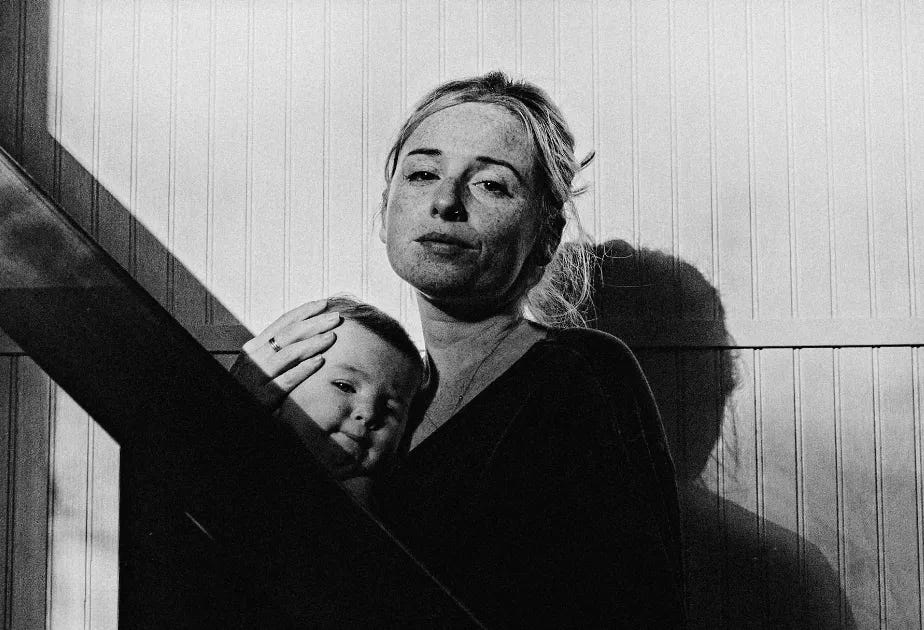














Share this post